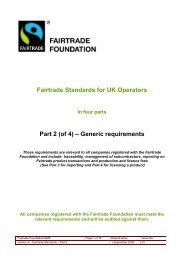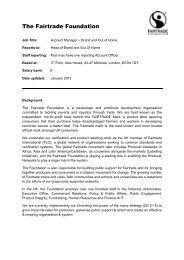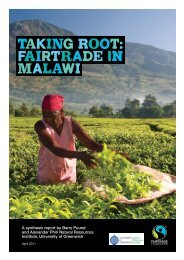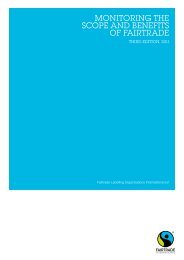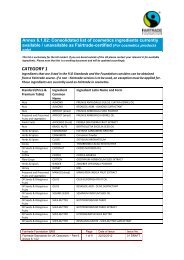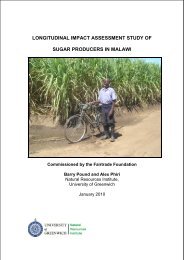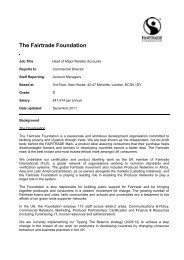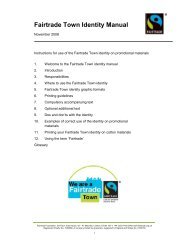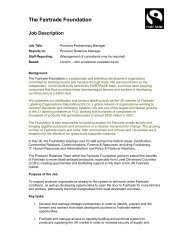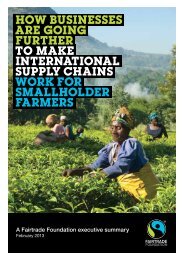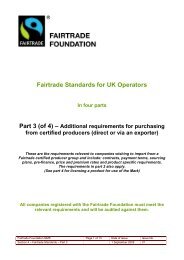Fairtrade and Coffee Report 2012 - The Fairtrade Foundation
Fairtrade and Coffee Report 2012 - The Fairtrade Foundation
Fairtrade and Coffee Report 2012 - The Fairtrade Foundation
Create successful ePaper yourself
Turn your PDF publications into a flip-book with our unique Google optimized e-Paper software.
Futures markets <strong>and</strong> speculators<br />
Like other commodities, coffee can be traded in two<br />
ways: either physically bought or sold on the<br />
spot market, or traded on international futures<br />
markets. Arabica coffee prices are set at the New York<br />
Intercontinental Exchange (ICE) futures market <strong>and</strong><br />
robusta prices at London Liffe.<br />
<strong>The</strong> trading of futures contracts – a commitment to<br />
buy or sell a st<strong>and</strong>ardised quantity of coffee beans<br />
at a specified place <strong>and</strong> time in the future – is a tool<br />
used by commercial traders <strong>and</strong> producers to ‘hedge’<br />
or protect against the risk of loss through future price<br />
fluctuations <strong>and</strong> exchange rate movements.<br />
Futures markets are also used by financial institutions<br />
(e.g. hedge funds, investment banks, pension funds)<br />
<strong>and</strong> private individuals to gamble on the price of<br />
coffee. This speculation by non-commercial traders<br />
is coming under increasing criticism in the industry<br />
for distorting the market. Starbucks CEO Howard<br />
Schultz pointed the finger at financial speculators for<br />
the ‘tragic’ surge in coffee prices in 2010, telling a<br />
gathering of analysts <strong>and</strong> investors in New York: ‘This<br />
is financial speculation at its worst.’ 13 This sentiment<br />
was echoed by Andrea Illy, Chief Executive of Italy’s<br />
Illycaffè, who said speculators have pushed the price<br />
of coffee to an unjustifiably high level <strong>and</strong> could be<br />
setting the sector up for a cycle of boom <strong>and</strong> bust in<br />
the next few years. 14<br />
As well as hedge funds <strong>and</strong> speculators, index funds<br />
are increasingly buying into commodities because<br />
of much better returns than equities. 15 <strong>The</strong> World<br />
Bank estimates a record $450bn was invested in<br />
commodities in 2011 – more than three times that in<br />
2006. 16 <strong>The</strong>re is growing concern about the impact<br />
speculation has on the volatility of the prices of basic<br />
food commodities. In 2008 <strong>and</strong> 2010 record high<br />
food prices put staples like maize, wheat <strong>and</strong> rice<br />
beyond the means of the world’s poorest people,<br />
sparking food riots across more than 30 countries<br />
<strong>and</strong> increasing political unrest. In a 2010 briefing,<br />
the UN Special Rapporteur on the Right to Food<br />
said ‘a significant portion of the increases in price<br />
<strong>and</strong> volatility of essential food commodities can only<br />
be explained by the emergence of a speculative<br />
bubble. In particular, there is a reason to believe that<br />
13 Starbucks blasts speculation in coffee, Reuters, 1 December<br />
2010, www.reuters.com/article/2010/12/01/starbucks-coffeeidUSN0115085320101201<br />
14 Speculators setting coffee up for boom-bust,<br />
www.commodities-now.com 13 March 2011<br />
15 Wall Street Journal, 8 December 2010<br />
16 Global Economic Prospects January <strong>2012</strong>, Global Commodity<br />
Market Outlook, World Bank<br />
a significant role was played by the entry into markets<br />
for derivatives based on food commodities of large,<br />
powerful institutional investors such as hedge funds,<br />
pension funds <strong>and</strong> investment banks, all of which<br />
are generally unconcerned with agricultural market<br />
fundamentals.’ He went on to say ‘fundamental reform<br />
of the broader global financial sector is urgently<br />
required in order to avert another food price crisis’. 17<br />
How weather <strong>and</strong> climate change affect<br />
coffee prices<br />
<strong>Coffee</strong> trees require specific climatic conditions<br />
to produce an optimum crop. Production is often<br />
disrupted by adverse weather such as drought or<br />
frost which can affect the critical flowering stage that<br />
determines the size of the subsequent crop.<br />
Production in Brazil, supplier of a third of the world’s<br />
coffee, has a huge influence on world prices. Weather<br />
conditions there are closely monitored <strong>and</strong> news of<br />
late rains or frosts echo around the world in minutes,<br />
with prices reacting accordingly. <strong>Coffee</strong> output in<br />
Brazil has a two-year cycle – a good crop is followed<br />
the next year by a smaller crop when the trees ‘rest’<br />
– which can mean an output difference of as much<br />
as 900,000 tonnes or 30 per cent. <strong>Coffee</strong> stocks held<br />
in consuming countries will normally meet any deficit<br />
in the market but if it coincides with a significant fall<br />
in production in other countries then the market may<br />
face a shortage. International futures markets will react<br />
with higher prices which, in turn, incentivise growers<br />
to increase production to capitalise on those prices.<br />
<strong>The</strong>se short-lived booms are usually ended when<br />
favourable weather conditions allow both supply <strong>and</strong><br />
stocks to recover, typically leading to oversupply <strong>and</strong> a<br />
return to lower prices.<br />
On top of these recurrent weather patterns, climate<br />
change is having an increasing influence on where<br />
<strong>and</strong> how coffee is produced in future <strong>and</strong> will be<br />
a huge risk for smallholders – a group who bear<br />
little responsibility for its causes but are the most<br />
vulnerable <strong>and</strong> least equipped to deal with it.<br />
Climate change is causing higher temperatures,<br />
erratic rains or periods of drought which can affect the<br />
flowering stage, hinder the drying of harvested beans<br />
<strong>and</strong> reduce soil fertility. As confirmed by a recent study<br />
by the Natural Resources Institute, 18 these changes are<br />
17 Food Commodities Speculation <strong>and</strong> Food Price Crises, Olivier de<br />
Schutter, United Nations Special Rapporteur on the Right to Food,<br />
Briefing Note 02, September 2010<br />
18 Climate Change, Agricultural Adaptation <strong>and</strong> <strong>Fairtrade</strong>, NRI Working<br />
Paper, Natural Resources Institute, May 2010,<br />
www.nri.org<br />
8 <strong>Fairtrade</strong> <strong>and</strong> <strong>Coffee</strong>



